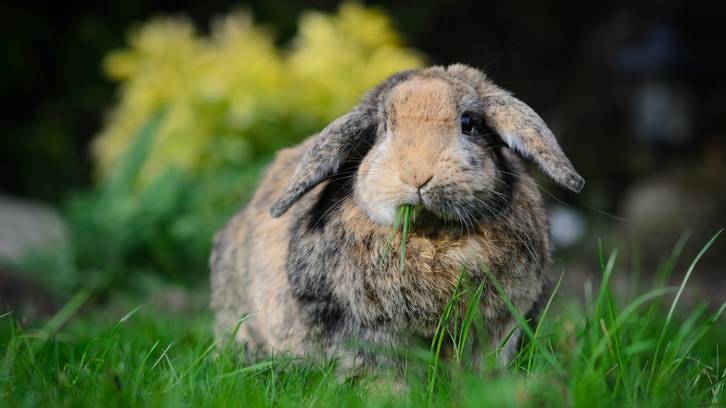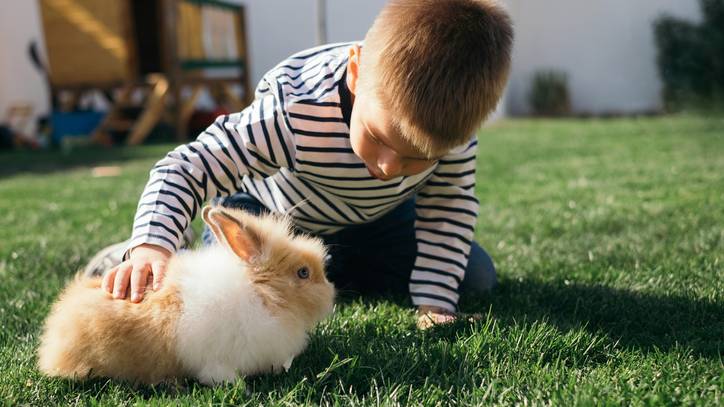Rabbit noises: A vet explains what your rabbit is trying to tell you
You may think that rabbits don’t communicate verbally, but rabbit noises can mean different things

Get the best advice, tips and top tech for your beloved Pets
You are now subscribed
Your newsletter sign-up was successful
Rabbit noises can be difficult to interpret, but did you know that your rabbits ‘speak’ both verbally (with sounds) and by using body language? Some rabbit noises can be subtle and easy to miss, especially if we are not aware of them, but others are more obvious.
It is important to understand what your rabbits are communicating to you, and what their noises mean, so you know when they are happy, fearful, in pain, or unhappy about something.
Unsuitable housing can cause rabbits to be unhappy and rabbits will be miserable if they are confined to a cage or hutch. The best indoor rabbit hutches allow access for the rabbits to go in and out of the cage at all times and they should never be shut inside.
- Do rabbits bite? Understanding why your bunny bites
- Housing rabbits: choosing the perfect accommodation
- How to stop rabbits fighting
Purring
Rabbit purring is different from the purring sound that cats make. When cats purr, we hear an obvious rattling sound, whereas rabbits purr by softly grinding their teeth – almost a cross between a chewing action and teeth chattering. This means the rabbit is content and happy.
Rabbits might purr like this when they are being stroked in a favorite place or being groomed by a companion rabbit. It is important not to confuse tooth purring with tooth grinding, as the two mean very different things.
Grinding teeth
Rabbits grind their teeth (bruxism) when they are in pain. Teeth grinding is often accompanied by other ways of communicating pain, such as sitting hunched up, not eating, or eating less, passing fewer or no droppings, having a bloated abdomen, and being uninterested in their surroundings and companion. When rabbits grind their teeth, they grate them together.
A common reason for tooth grinding is abdominal pain, caused by gastrointestinal stasis, whereby the digestive system slows down or stops. Always make sure you are feeding rabbits correctly – 85 percent of their diet should consist of grass and hay, while 10 percent should come from fresh herbs and greens, and the remaining five percent from good quality pellets. This is one of the best ways to help avoid gastrointestinal stasis.
Get the best advice, tips and top tech for your beloved Pets
If you hear your rabbit make a tooth grinding sound, you must take them to your vet straight away, even if there are no other obvious signs.
Growling
Rabbits growl and grunt in an attempt to defend themselves or their territory and as a way of expressing they are not happy about something. If you have ever thought, do rabbits bite? then the answer is yes, they do, and often this will be accompanied by growling when they are protecting themselves or something else.
They may growl and bite another rabbit, especially during failed bonding attempts or if the two rabbits are not familiar with each other. They will also growl, lunge, and bite their owners. This behavior is more common in female rabbits that have not been spayed but can be exhibited by either males or females and those who are neutered or entire.

Thumping
Rabbits have large, powerful back legs and feet, and thump their back feet on the ground to warn other rabbits of potential danger, or when they are annoyed at something. The thumping of a foot is often followed by all the rabbits in the area running for cover.
Follow our guidance on housing rabbits to ensure you offer your rabbits safe and secure housing that meets their physical and behavioral needs and protects them from potential predators.
Screaming
Rabbits scream when they are in extreme fear or pain and it is a truly awful sound to hear. It is often heard when rabbits are caught by a predator or when handled roughly or incorrectly, especially if they are not used to being handled.
If a rabbit screams, they are at serious risk of suffering from a heart attack, so it is important never to startle your rabbits, always handle them carefully and only when necessary. If they do scream, stop what is being done to them immediately.
Humming and honking
If your rabbit runs around humming and sounding like a bee, this means they are in love with whatever it is they are running around. This is more often seen in male rabbits that have not been castrated. Providing games for rabbits, with lots of enrichment and things to do, may also evoke this behavior.
Whimpering
A whimpering sound may be heard when your rabbit is displeased or worried about something. Many rabbits also make a squeaking or whimpering sound when they are eating their caecotroph dropping.
Summary
Rabbits make many noises, and some can sound similar to others, but mean very different things. If we understand what our rabbits are telling us, it helps us to resolve problems and know what makes our rabbits happy.
Claire currently works in Kettering as a Head Nurse in a practice with a high rabbit caseload, as well as frequently lecturing and writing on rabbits to both veterinary professionals and owners.

